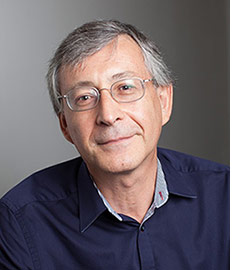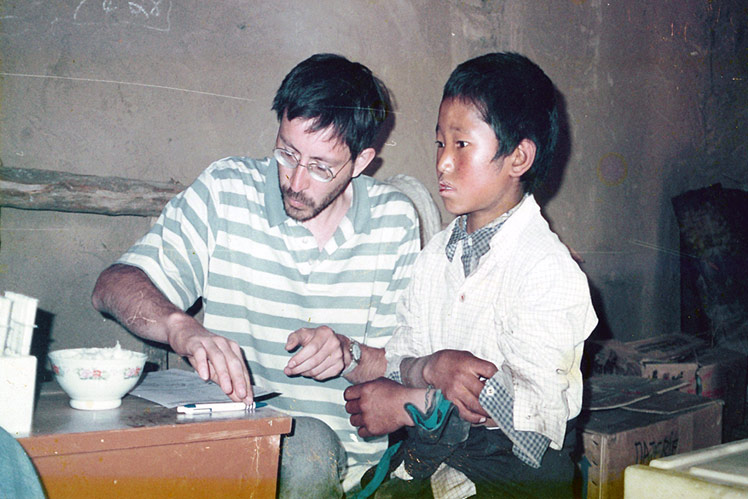Iodine Global Network (IGN)
Sprunglinks/Accesskeys
Zur Startseite (Accesskey 0) Direkt zur Hauptnavigation (Accesskey 1) Direkt zum Inhalt (Accesskey 2) Kontakt (Accesskey 3) Sitemap (Accesskey 4) Suche (Accesskey 5)
DONATE

The little-known (but large) problem of iodine deficiency in Europe
June 2021
Estimates suggest that up to 50% of infants in Europe are at risk of being iodine deficient.
The role of Regional Coordinator is crucial to IGN’s work. Nowhere is that more true than in Europe, which presents its own particular problems in relation to iodine deficiency.
“If we look at recent surveys, we see that all countries have iodine sufficiency in terms of children. But it’s different if you look at the adult population. 54% of countries reported low iodine among the adult population and 64% reported deficiency among pregnant women”, says new IGN Regional Coordinator for Western and Central Europe, Dr. Rodrigo Moreno-Reyes. He explains that when iodine intake is low, the thyroid is stimulated, increasing the risk of thyroid disease among many millions of adults. For pregnant women, even mild deficiency can cause hyperstimulation of the thyroid, and the risk increases in subsequent pregnancies.
Dr. Moreno-Reyes believes there is a need to improve our communication on this issue. “Decreasing the incidence and prevalence of thyroid disease in Europe clearly makes economic sense in terms of the burden of disease. We need to put a focus on this as a health issue, as we have the data to support this case.”
Dr. Moreno-Reyes says the availability of iodine in food products through salt is the easiest way of addressing the issue, and his priority is to work with the European Commission, Parliament, the food industry and others to do so. IGN hopes to work with the World Health Organization, Kiwanis International and other partners to further this agenda.
IGN, together with the World Iodine Association, EUthyroid and other organizations, endorsed the Krakow Declaration on Iodine in 2018, and in June 2020 called on Member States and the European Union to adopt a harmonized policy framework to ensure optimal iodine intake in the population.
“It is very sad to see that in several European countries (for example Germany, Norway) iodine deficiency continues to exist among large groups of the population, says IGN’s Executive Director Werner Schultink. “These countries have strong public health systems and should be able to solve this threat to health, wellbeing and child development posed by iodine deficiency. It is important to recognize in the European context that the effort to reduce sodium intake is perfectly compatible with the need to iodize the salt which is used in households and/or for food production”.
Read more here:
The role of Regional Coordinator is crucial to IGN’s work. Nowhere is that more true than in Europe, which presents its own particular problems in relation to iodine deficiency.
“If we look at recent surveys, we see that all countries have iodine sufficiency in terms of children. But it’s different if you look at the adult population. 54% of countries reported low iodine among the adult population and 64% reported deficiency among pregnant women”, says new IGN Regional Coordinator for Western and Central Europe, Dr. Rodrigo Moreno-Reyes. He explains that when iodine intake is low, the thyroid is stimulated, increasing the risk of thyroid disease among many millions of adults. For pregnant women, even mild deficiency can cause hyperstimulation of the thyroid, and the risk increases in subsequent pregnancies.
Dr. Moreno-Reyes believes there is a need to improve our communication on this issue. “Decreasing the incidence and prevalence of thyroid disease in Europe clearly makes economic sense in terms of the burden of disease. We need to put a focus on this as a health issue, as we have the data to support this case.”
Dr. Moreno-Reyes says the availability of iodine in food products through salt is the easiest way of addressing the issue, and his priority is to work with the European Commission, Parliament, the food industry and others to do so. IGN hopes to work with the World Health Organization, Kiwanis International and other partners to further this agenda.
IGN, together with the World Iodine Association, EUthyroid and other organizations, endorsed the Krakow Declaration on Iodine in 2018, and in June 2020 called on Member States and the European Union to adopt a harmonized policy framework to ensure optimal iodine intake in the population.
“It is very sad to see that in several European countries (for example Germany, Norway) iodine deficiency continues to exist among large groups of the population, says IGN’s Executive Director Werner Schultink. “These countries have strong public health systems and should be able to solve this threat to health, wellbeing and child development posed by iodine deficiency. It is important to recognize in the European context that the effort to reduce sodium intake is perfectly compatible with the need to iodize the salt which is used in households and/or for food production”.
Read more here:
About Dr. Moreno-Reyes


A young Dr. Moreno-Reyes working with children

A young Dr. Moreno-Reyes working with children